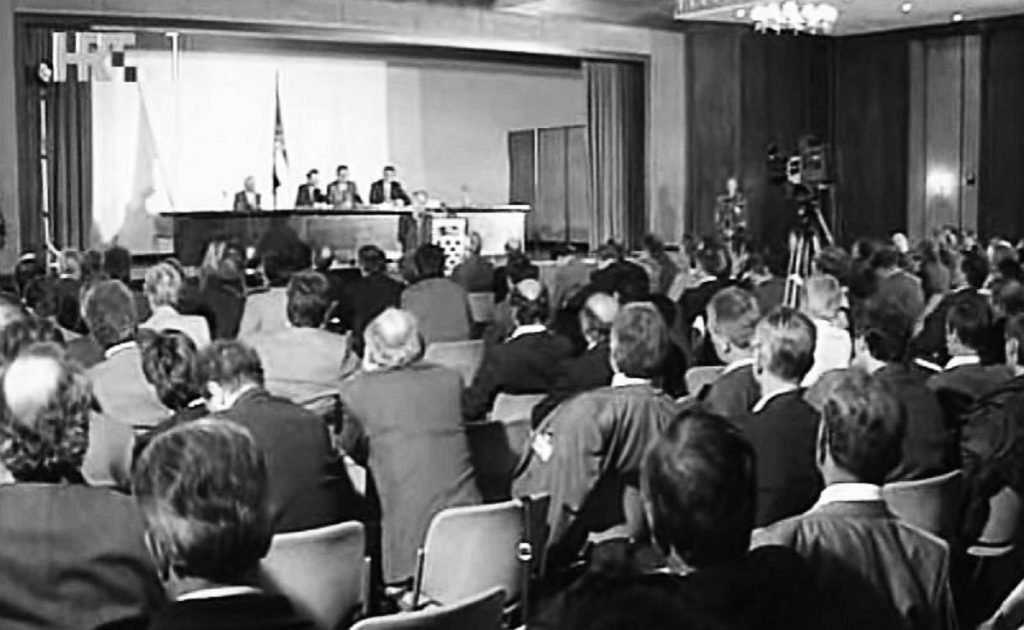After Croatia declared independence on 25 June 1991, the international community postponed the declaration for three months on 7 July through the Brijuni Declaration. In those three months, the Serb uprising in Croatia escalated and the Yugoslav People’s Army (YPA) openly unleashed its aggression upon the Republic of Croatia.
With the victory of Croatian forces in the battle over military facilities in September 1991, the situation changed drastically. At the beginning of October, the YPA launched a broad, general assault against Croatia on several fronts. When that failed, the YPA desperately attempted to assassinate three leading Croat politicians. By bombing the Viceroy’s Palace in Zagreb, where Croatian President Franjo Tuđman, Yugoslav President Stjepan Mesić and Yugoslav Prime Minister Ante Marković met on 7 October, the YPA finally showed its true face to the entire world. If the assassination had succeeded, Croatia would have been beheaded and its path to independence would have been much more difficult.
However, the tragedy was avoided by sheer luck and on 8 October the process of separation from the disintegrating Socialist Federal Republic of Yugoslavia (SFRY) was completed at a secret location in the INA building in Šubićeva Street in Zagreb. In dramatic circumstances, the required majority of members of parliament gathered in the basement of the building to vote on one of the most important matters in recent Croatian history.
Despite the danger looming over the Croatian capital, nobody except Serbian representatives wavered at the task at hand. While the Parliament was in session, the multi-party commission comprised of Vice-Presidents Vladimir Šeks from the Croatian Democratic Union (CDU) and Ivica Percan from the Party of Democratic Change (PDC) along with deputies Hrvoje Kačić, Vladimir Veselica and Đuro Vidmarović drafted the text of the decision which would finally break all state and legal ties with Yugoslavia. In the meantime, Croatian Prime Minister Franjo Gregurić addressed the Parliament, saying, among other things:
It is evident that within the former Yugoslavia there is no ability and readiness to seek solutions in the manner envisaged by the Brijuni Declaration, that is, peacefully and democratically. We have shown determination, courage and the ability to withstand the heaviest of blows in order to defend Croatia’s freedom and democracy. That is why, ladies and gentlemen, I invite you to jointly state that the moratorium is a thing of the past and that the decisions of this Parliament through which Croatia is a sovereign and independent state are valid from this day onward.
Finally, after Vladimir Šeks presented the text of the decision to the deputies, it was put to a vote and received unanimous support. All countries, especially members of the European Community and the United Nations, were invited to establish diplomatic relations with the Republic of Croatia. Until 2019, the day when the Croatian Parliament passed the Decision on the Termination of all State Legal Ties of the Republic of Croatia with the former State of the SFRY was celebrated as the Independence Day of the Republic of Croatia. That day is currently designated as Croatian Parliament Day.
Đuro Vidmarović, one of the members of the commission that drafted the decision recalled those moments of unity:
I believe that national unity was achieved at that moment, that is, the inevitable political consensus that arises when the vital, important and crucial national interest takes precedence over secondary political, party or personal interests and I do not think that we have ever achieved such unity as we did then.
Magistar sam povijesti. Radno iskustvo stjecao sam u Hrvatskom povijesnom muzeju i na Hrvatskoj radioteleviziji u emisiji TV Kalendar. Autor sam nekoliko knjiga i filmova na temu Domovinskog rata. Osnovao sam i uređujem Facebook stranicu Dogodilo se na današnji dan – Domovinski rat i portal Domovinskirat.hr. Također uređujem i vodim emisiju Domoljubne minute koja se svakog dana emitira na Hrvatskom katoličkom radiju te emisiju Sve za Hrvatsku i Novi valovi dobrote. Vlasnik sam obrta CroHis kojim promičem vrijednosti Domovinskog rata.

